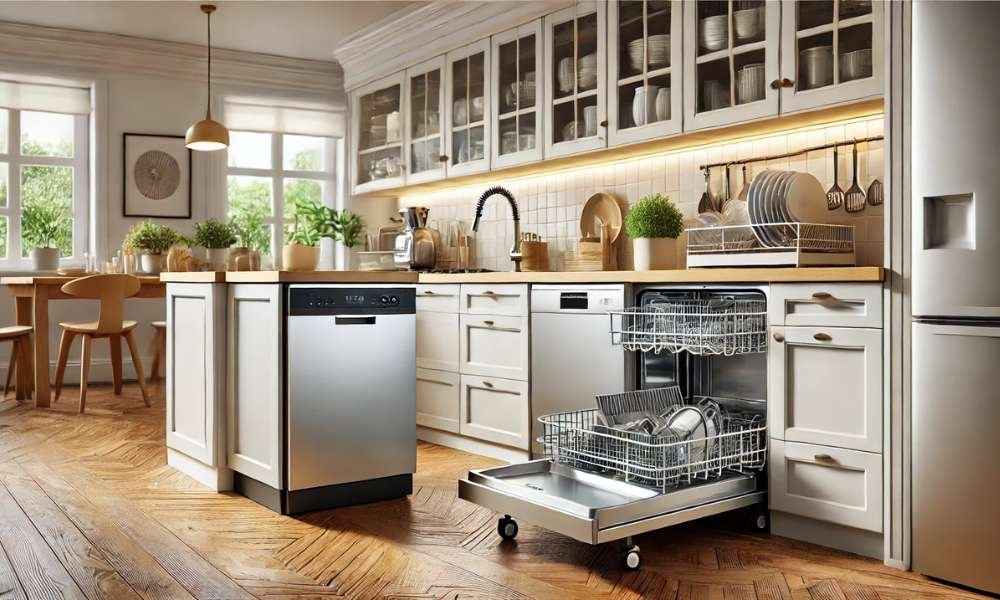When you’re out shopping for a dishwasher, the weight might not be the first thing that pops into your mind. But it should be. The weight isn’t just a number—it’s crucial when you’re thinking about installation, transportation, and the dishwasher’s overall functionality. Knowing how much a dishwasher weighs can make all the difference when making a smart decision for your kitchen setup.
Types of Dishwashers and Their Weights…

Dishwashers? They come in all shapes and sizes. And guess what? Their weights are just as varied. Standard built-in models? Those can tip the scales anywhere from 60 to 120 pounds. Now, if you’re eyeing a compact model, you’re looking at something lighter, around 40 to 70 pounds. Portable dishwashers sit in the middle, weighing in between 50 to 100 pounds. And those fancy drawer dishwashers? They’re on the heftier side, sometimes weighing as much as 150 pounds.
Factors That Affect Dishwasher Weight
Several elements contribute to a dishwasher’s weight. One of the biggest? Material. A stainless steel interior might be more durable, but it’s also going to pack some extra pounds. Then there’s size, capacity, and those cool high-tech features like smart connectivity or extra-special wash cycles. They all add up when it comes to weight.
Brand Comparisons
Not all brands are created equal—especially when it comes to Mass. High-end brands like Bosch or Miele tend to produce heavier machines loaded with features. On the other hand, more budget-conscious brands like Whirlpool or Frigidaire keep things lighter and simpler.
Heavier vs. Lighter Dishwashers
So, should you go heavier or lighter? Well, heavier dishwashers often mean better performance, sturdier materials, and more advanced features. But be ready—they’re also harder to install. Lighter dishwashers? They’re easier to manage, though they may not provide the same level of long-lasting durability. It all boils down to what you need and the space you’ve got in your kitchen.
How to Check Dishwasher Weight Before Buying

Want to know the weight before you hit the checkout? Most manufacturers include the Mass in the product specs. It’s always a good idea to check these details beforehand, especially if you’re concerned about how easy—or hard—it will be to install or transport.
Installation Considerations
Speaking of installation, heavier dishwashers might require professional help because of their bulk. And don’t forget to check if your kitchen floor can handle the weight—especially with those larger models.
Portable vs. Built-In: Weight Differences
The type of dishwasher you choose will impact its Mass. Portable dishwashers? Typically lighter because of their smaller size. Built-ins? They’re heavier, thanks to their larger capacity and the fact that they’re installed permanently.
Weight and Efficiency
Heavier dishwashers tend to have better insulation, which helps reduce noise and boosts energy efficiency. But don’t count out lighter models—some of them still manage to be highly efficient without the added Mass.
Weight and Performance
When it comes to performance, heavier often means better. More weight typically comes with a more powerful motor and stronger cleaning cycles. But for lighter models, they can still hold their own—especially for smaller loads or occasional use.
Adding to the Weight: Full Loads
Here’s a surprise—once fully loaded, a dishwasher can become significantly heavier. The dishes and water can add an extra 20 to 30 pounds, which can affect how it operates and how much Mass your floor is bearing.
Transporting and Moving a Dishwasher
Got a heavy dishwasher to move? It’s no small task. Dollies are your friend here, or better yet, hire some professionals. Lighter models are easier to handle but still require care during transportation.
Weight and Durability
Typically, heavier dishwashers last longer, mainly because they’re made with more durable materials like stainless steel. So, while you’re dealing with extra Mass, you’re also getting a longer lifespan and more reliability out of the deal.
DIY Installation and Heavy Dishwashers
Thinking about doing the installation yourself? Lighter dishwashers are much easier to manage solo. But for the heavier ones? Call in the pros to avoid any damage to the machine—or worse, your home.
Smart Dishwashers and Weight
Those smart dishwashers with all the bells and whistles? They tend to be heavier because of all the extra components. But the trade-off? You get convenience, improved efficiency, and a bit of futuristic flair in your kitchen.
Shipping Costs Based on Mass
Heavier dishwashers don’t just cost more at the store—they’ll likely hit you with higher shipping fees too. That’s because they often need freight shipping. So, if you’re ordering online, don’t forget to factor in those shipping costs.
Dishwasher Price and Weight
In general, the heavier the dishwasher, the higher the price. More Mass usually means more durable materials and better features. But even lighter models can have hefty price tags, especially if they come with niche features or designs.
Final Thoughts
While weight is an important factor when choosing a dishwasher, it’s just one part of the equation. You’ll need to balance the Mass with other elements like features, performance, and efficiency to make the best decision for your kitchen setup.
